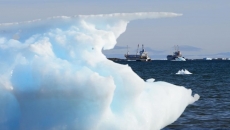Indigenous and non-Indigenous fishermen are calling on the Canadian government to settle a lobster-fishing dispute following a weekend of tension during which lobster traps set by Mi'kmaq fishermen were removed in St. Marys Bay.
A flotilla of non-Indigenous fishermen removed about 350 traps off the coast of southwestern Nova Scotia, Rhonda Knockwood, director of operations for Sipekne'katik First Nation, said Monday. She said the federal government needs to clearly define the treaty rights of the Mi'kmaq people to earn a living off fishing.
Sipekne'katik First Nation says its people have a treaty right to fish at any time. Non-Indigenous fishermen say the First Nation is illegally fishing off-season.
Knockwood said in a statement the tensions between the two groups is a culmination of years of frustration with the Department of Fisheries and Oceans and "their deliberate dithering and underhanded tactics surrounding the negotiations to define a moderate livelihood and implementation of the Treaties."
Colin Sproul, president of the Bay of Fundy Inshore Fishermen's Association, said the action taken Sunday by the non-Indigenous fishermen was necessary to remove the "illegal" traps. He said the lobster-fishing season in St. Marys Bay doesn't start until the last Monday of November every year.
Lobster fishing in the area is closed from May 31 until late November, Sproul explained in an interview Monday, to allow the crustaceans to safely mate during their reproductive period, as the lobsters' shells moult and soften during this time.
Indigenous groups say their right to fish off-season was confirmed in a Supreme Court of Canada case 21 years ago. Knockwood says the government of Canada has yet to create permanent policies in the region that reflect that decision.
Sproul said Sunday's flotilla removed the traps under the watch of RCMP, coast guard boats and police helicopters. He said his association respects Indigenous treaty rights but it doesn't think it's appropriate to fish off-season in a nursery ground such as St. Marys bay.
The federal government, he said, needs to preserve law and order. He accused Fisheries Minister Bernadette Jordan of being unwilling to "put conservation ahead of politics." Jordan did not immediately respond to a request for comment.
On Monday, Nova Scotia Premier Stephen McNeil said in a statement the province recognizes the treaty rights of the Mi'kmaq First Nation but he admitted "many of the details surrounding the nature and extent of those rights are not clear."
Clarification, he said, "is best addressed through open and respectful dialogue."






